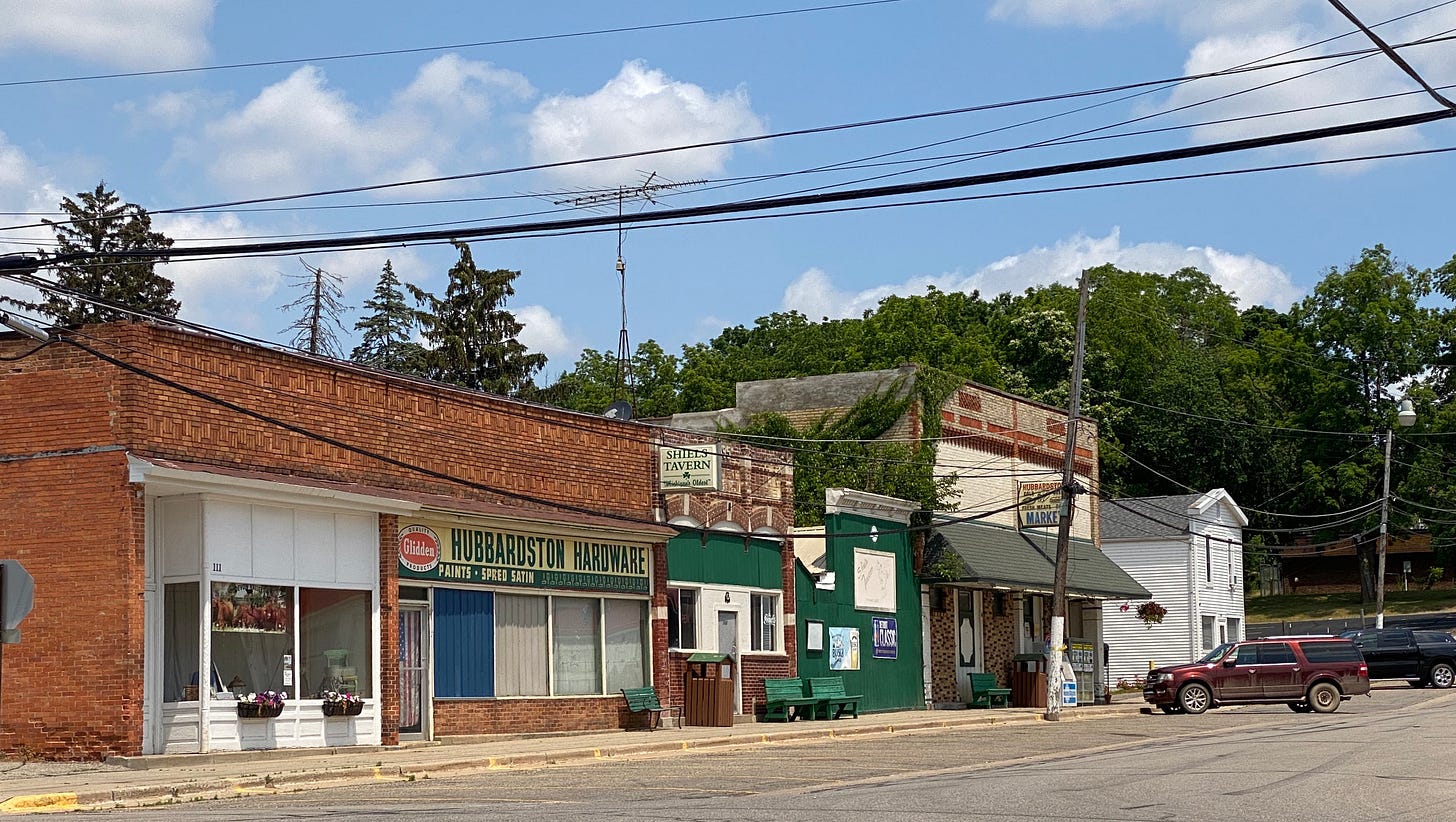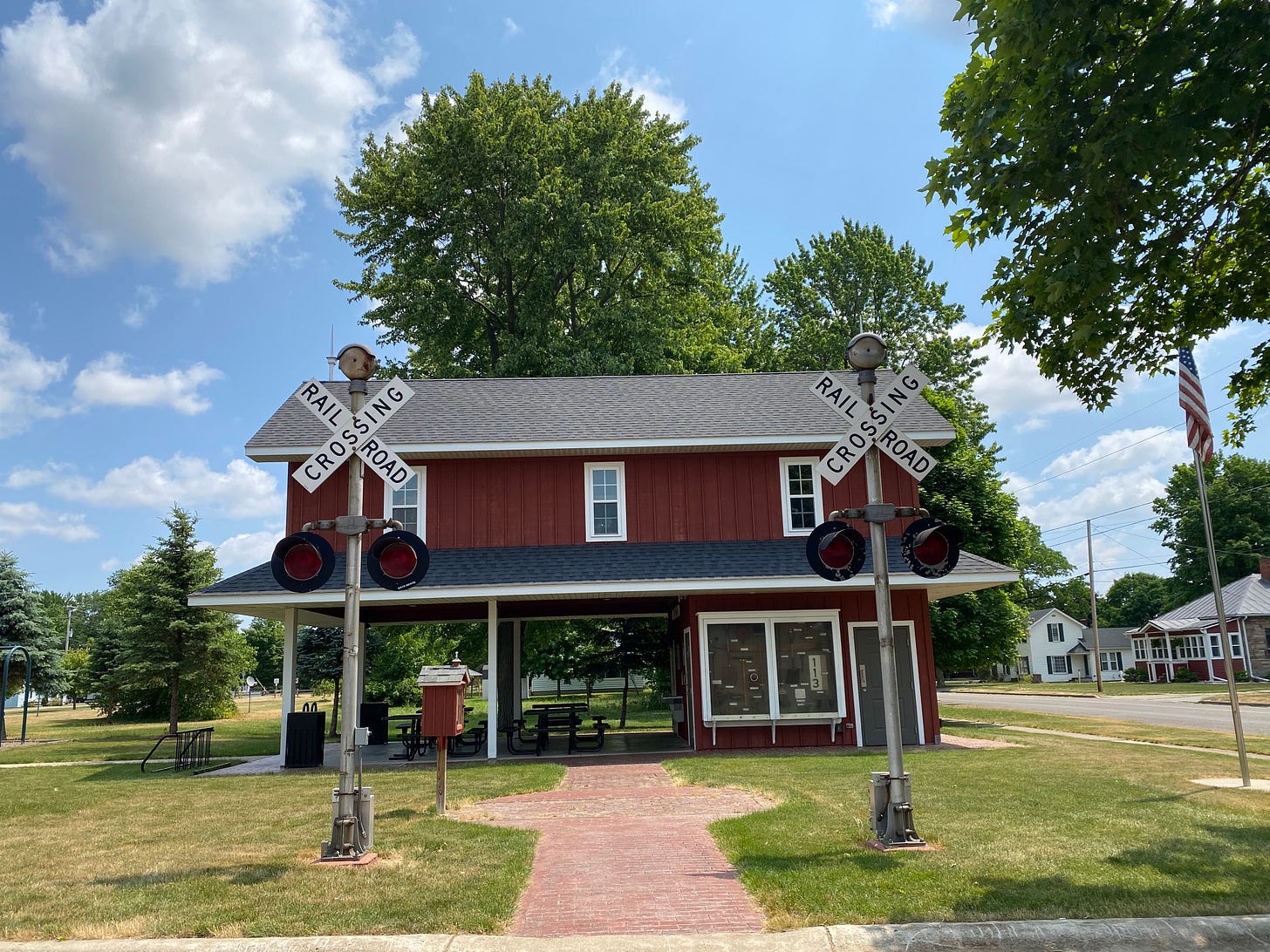I’ve been reflecting on this for a few weeks after returning from my 10 day road trip through the midwest.
Do most Americans have a sense of an ancestral home?
We know to be true that a country built on hope and a better life, most Americans are essentially immigrants. From the early founders to the current border control immigrant crisis, most everyone ancestrally is from somewhere else.
But what happens when families have several generations on the land, do they remember an ancestral home, or has the idea of place just been entirely wiped out?
My trip was a continuation of my small town America journey.
The formula is this. Make a general plan to visit and tour the state capitol of each state visited. Find a motel for the night, preferably with classic neon signage. Find a classic diner for a big morning breakfast before hitting the road.
This road trip brought me through Michigan, Wisconsin, Illinois, Indiana, and Ohio.
Other than the capitol cities, the rest of the time was spent on the small roads that wind through small town after small town. The entire 10 days were spent driving across miles of fields with corn and soybean crops, dotted with gleaming silos and scattered with large chicken or milk farms.
Each small town is the same. One to four blocks of a town center that includes a post office, a bank, a bar, a liquor store, some sort of old general store, perhaps a movie theater, a few small businesses, possibly an abandoned rail road station. On the town edge invariably a Dollar General with a car park full of cars.
Also on the town edge or half a mile out, there is a cemetery.
That’s what got me thinking of ancestral home and sense of place.
In China, one’s ancestral home is key in forging ones identity.
After asking someone's name, the most common as well as most pertinent question you hear people ask one another when first introduced, "where in your laojia?" .
老家 (lǎo jiā) = ‘old home’ = ancestral home
Chinese ask because nothing else is meant to be as telling, as shorthand, in determining interests, personal habits, even taste in food of a person you've just met.
I’ve talked to hundreds of people in China, from big cities to the smaller province towns. Sometimes with dialects so strong that we could only communicate the basics.
One of the basics is laojia.
The conversation always turns to ‘where are you from’ and ‘lao jia’. It is a doorway to discussing and sharing our origins and also differences.
There is a two-way curiosity and conversation becomes easy.
On a deeper cultural level, I think laojia provides a middle layer of identity for all Chinese, between family and country.
Deeply ingrained in Chinese culture are Confucian concepts of defending the family and defending the country (保家卫国) and territory that is historically theirs.
It is a cultural inheritance that runs through thousands of years of Chinese history and is deeply rooted in the national bone marrow. It has never changed and will not change.
With that contrast, my questions revolved around trying the understand the American psyche, the basics of what makes people tick.
I can say that for the whole 10 days, through small towns with disappearing train tracks and preserved train stations offered a distant memory of what America perhaps was.
Boarded up small stores, empty streets, and abandoned cars, perhaps a sign that small town America was disappearing. Or was it merely moving to the strip mall areas just 45-60 minutes away?
Are most Americans desperately seeking an identity?
And because of the very short history, are the offerings of cultural identity sparse and difficult to find a common cultural ground?
From observation, grasping for identity seems to be grounded in the polarized world of politics, the popularity race that you can get behind. Sports is just the same. The amount of blaring televisions I saw in diners or motel lobbies broadcasting sport, CNN, Fox News was consistent.
It was everywhere.
I felt I entered an alternate world of loud blaring fake news that was distinct and far away from what the rest of the world was really like.
And in this alternate world, I first learned of a very insignificant player on the US political scene. On a blaring TV in a small town Indiana diner, there was the extreme fear-mongering, wide-eyed Nikki Haley spewing forth her presidential campaign opinions.
Blaming China for all of the shortcomings in America, from education, homelessness, drug addiction, failing infrastructure, lagging tech innovation, economic failings.
I sat in semi-disbelief. Is this what is peddled as truth?
It felt Orwellian.
There is no common narrative in America. The only narrative is to tear apart.
Is it because the middle layer no longer exists? Is the glue between self, family and country so diluted that sense of place and ancestral home don’t exist?








